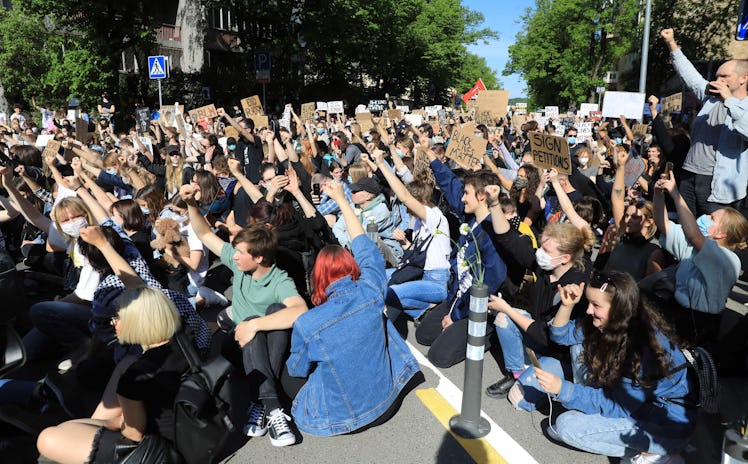
If You Plan On Protesting, Here's What To Know About Self-Quarantining
The United States is in the midst of powerful mass protests fighting racial injustice and the recent killings of Black Americans George Floyd, Breonnna Taylor, and Tony McDade at the hands of police, along with the killing of Ahmaud Arbery in a confrontation with two white men. While crowds gather to support Black Lives Matter and take a stand against police brutality and systemic racism, you may be planning to take to the streets to join a protest. While health and safety is still a major concern in the light of the ongoing novel coronavirus pandemic, you may be wondering if you should self-quarantine after protesting. Here's what experts suggest doing following a mass protest.
As mass protests broke out the weekend of May 30, there's a rising concern over the health of demonstrators — and whoever they come in contact with — amid the coronavirus pandemic. The country has been working to slow the spread of the virus, and though there's been progress, the coronavirus, also referred to as COVID-19, is still a threat. With massive gatherings of protesters across the country, the United States may see a rise of infections.
Rachael Piltch-Loeb, Ph.D, a preparedness fellow at Harvard's T.H. Chan School of Public Health, tells Elite Daily about the risks. "Protesting reflects the important conversation in our country and is a step to demonstrating against police brutality," Piltch-Loeb says. "The risks related to coronavirus of joining a large group protest are similar to any mass gathering: the more people you come in contact with, the more your chances of catching the virus."
Piltch-Loeb explains certain protesters may have an increased risk of catching the virus. "This is especially the case for protestors who are often speaking loudly or shouting in solidarity and who may be getting sprayed with tear gas causing secretions from their eyes or respiratory tract," she says. Police, who have been blamed for initiating and escalating violence at the protests, have frequently doused demonstrators in tear gas, pepper spray, and used other less-lethal (but still harmful) measures of crowd control.
For many, the threat and harm caused by police violence and racism, and the need to protest against it, outweighs the risk of the coronavirus. But in response to the protests, some health officials are asking protesters to quarantine themselves afterward for 14 days, if possible. Chicago Department of Public Health Commissioner, Dr. Allison Arwady, made a statement on Monday, June 1, in response to the rise of mass protests in the Illinois city. "While we continue to make progress, I am concerned we may see ourselves take a step backward down the line against COVID-19," Arwady said. "That's because COVID-19 is caused by a virus, and that virus doesn't care about what's going on in the city," said Arwady, adding that despite what's happening, the virus "still takes every opportunity it can to spread."
Piltch-Loeb agrees that quarantine may be the best route. "If you can quarantine after protesting, that is great." The primary concern, Piltch-Loeb asserts, is to "avoid coming in contact with people in your network who may be at high risk for adverse outcomes associated with coronavirus." Piltch-Loeb notes, "Most importantly, don't go visit your elderly grandparents, anyone with [pre-existing conditions or chronic illnesses], and take whatever precautions you can. Assume you have been exposed and try to get tested within a few days," she says. Although the coronavirus is still a concern, Piltch-Loeb says she supports the act of protesting for a cause you believe in. "Protesting is important. Protesting in a pandemic just means extra precautions should be considered wherever possible."
If you do protest, keep in mind that although you may feel a quarantine isn't necessary because you were in a smaller group or taking extra precautions, people can show no signs or symptoms, despite testing positive for COVID-19. Karen Levy, Ph.D, MPH, an environmental microbiologist and epidemiologist and associate professor of environmental health at Emory University's Rollins School of Public Health, previously told Elite Daily, "There is good evidence to suggest that people with no symptoms can transmit the virus." Levy continued, "In fact, they might be the most infectious in the period before symptoms appear."
Piltch-Loeb echoes the sentiment, saying, "this is an asymptomatic virus that we still do not wholly understand. The assumption should be after coming in contact with so many people that you have been exposed." To keep yourself, as well as others, safer while you're protesting Piltch-Loeb says "it is best to wear a mask, avoid sharing water or other beverages, and to keep as much distance as possible from other protestors." Furthermore, she says it's best to "protest outside whenever possible."
As of April 24, the Centers for Disease Control and Prevention's (CDC) recommendations for protecting yourself and others from COVID-19, the disease caused by the novel coronavirus, you should avoid touching your eyes, mouth, and nose, regularly wash your hands or use hand sanitizer, and when possible, practice social distancing. In large crowds, it may be difficult to maintain a six-foot distance from others, but you can still use precautionary measures to protect yourself and use distancing practices when possible.
If you do join a protest, it's best to follow the advice of health experts and, if possible, commit to a 14-day self-quarantine to prevent the spread and avoid exposing friends or family members.
If you think you’re showing symptoms of coronavirus, which include fever, shortness of breath, and cough, call your doctor before going to get tested. If you’re anxious about the virus’s spread in your community, visit the CDC for up-to-date information and resources, or seek out mental health support. You can find all Elite Daily's coverage of coronavirus here.
Experts cited:
Rachael Piltch-Loeb, Ph.D, MPH, preparedness fellow at the Harvard T.H. Chan School of Public Health
Karen Levy, Ph.D, MPH, associate professor of environmental health at Emory University's Rollins School of Public Health